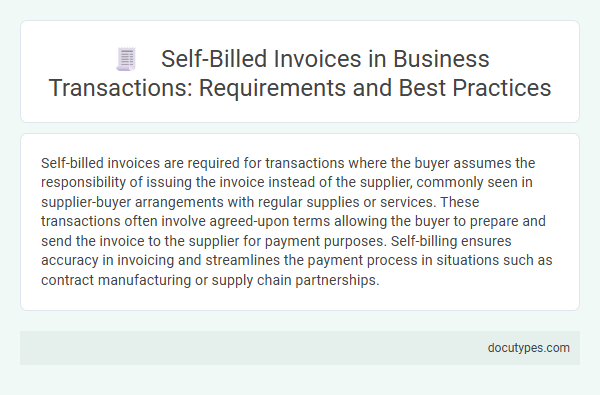Self-billed invoices are required for transactions where the buyer assumes the responsibility of issuing the invoice instead of the supplier, commonly seen in supplier-buyer arrangements with regular supplies or services. These transactions often involve agreed-upon terms allowing the buyer to prepare and send the invoice to the supplier for payment purposes. Self-billing ensures accuracy in invoicing and streamlines the payment process in situations such as contract manufacturing or supply chain partnerships.
Understanding Self-Billed Invoices: Definition and Overview
A self-billed invoice is a document issued by the buyer instead of the supplier, detailing goods or services received. This process is commonly used in business-to-business transactions where the buyer takes responsibility for invoicing.
Understanding which transactions require a self-billed invoice is essential for compliance with tax regulations. Typically, self-billing applies when both parties agree in advance and the arrangement is documented. Your involvement ensures accurate record-keeping and simplifies the payment process between businesses.
Key Legal Requirements for Self-Billing Arrangements
Self-billed invoices are required when a buyer issues an invoice on behalf of the supplier for a transaction. This arrangement must comply with specific legal requirements to ensure tax and accounting accuracy.
- Mutual Agreement - Both supplier and buyer must agree in writing to the self-billing arrangement before transactions occur.
- Accurate Record-Keeping - Both parties are responsible for maintaining detailed records of all self-billed invoices issued and received.
- Compliance with Tax Regulations - Self-billed invoices must comply with local VAT or GST rules, including valid invoice details and proper tax treatment.
Failure to meet these legal requirements can result in tax penalties or rejected invoices.
Benefits of Using Self-Billed Invoices in Business Transactions
Which transactions require a self-billed invoice? Self-billed invoices are commonly needed when the buyer generates the invoice on behalf of the supplier, such as in subcontracting or supply chain arrangements. Using self-billed invoices streamlines accounting processes and improves transaction accuracy in business dealings.
What are the benefits of using self-billed invoices in business transactions? Self-billed invoices reduce administrative workload by allowing buyers to manage billing, leading to faster payment cycles. Your business gains greater control over invoice details, minimizing errors and enhancing compliance with tax regulations.
How to Set Up a Self-Billed Invoice System
| Which Transactions Require a Self-Billed Invoice? |
|---|
| Self-billed invoices are necessary when suppliers agree that buyers prepare the invoice on their behalf. Common transactions include subcontracting services, supply of goods in retail, and long-term supply agreements. Self-billed invoices ensure accurate documentation when suppliers lack billing systems or to streamline invoicing between business partners. |
| How to Set Up a Self-Billed Invoice System |
|
Compliance and Documentation Standards for Self-Billing
Self-billed invoices are required when the buyer prepares the invoice instead of the supplier, ensuring accurate transaction records and compliance. Proper documentation standards must be followed to validate the authenticity and legality of these invoices.
- Buyer-Supplier Agreement - A formal agreement between buyer and supplier must exist to authorize self-billing transactions.
- Accurate Transaction Records - Self-billed invoices must include precise details reflecting the actual sale, such as quantities, prices, and tax information.
- Regulatory Compliance - Invoices must comply with local tax laws and documentation standards, ensuring they are acceptable for accounting and audit purposes.
Common Challenges in Self-Billed Invoicing and How to Overcome Them
Self-billed invoices are commonly required for transactions where the buyer is responsible for issuing the invoice instead of the seller. Challenges in self-billed invoicing often include compliance with tax regulations, ensuring accurate data entry, and managing timely approvals.
- Compliance with Tax Regulations - Navigating VAT and local tax laws can be complex, leading to potential legal issues if self-billed invoices are not properly issued.
- Data Accuracy - Errors in invoice details such as pricing, quantity, or supplier information can cause delays in payment and dispute resolution.
- Approval and Verification Delays - Obtaining timely internal approvals for self-billed invoices can slow down processing and affect cash flow management.
Best Practices for Issuing and Managing Self-Billed Invoices
Self-billed invoices are typically required for transactions where the buyer issues the invoice instead of the supplier, common in industries like manufacturing and construction. Best practices for issuing self-billed invoices include obtaining prior agreement from suppliers, ensuring accurate and detailed invoice data, and maintaining compliance with tax regulations. Your responsibility includes regularly reviewing and managing these invoices to prevent errors and support transparent financial records.
Audit Trails and Record-Keeping for Self-Billed Invoices
Self-billed invoices are required for transactions where the buyer issues the invoice instead of the supplier, often used in consignment or subcontracting arrangements. Maintaining accurate audit trails is essential to ensure compliance with tax authorities and to validate transaction authenticity.
Record-keeping for self-billed invoices must include detailed documentation of invoice issuance, acceptance by the supplier, and any adjustments made. Proper audit trails facilitate efficient verification during tax audits and help prevent discrepancies in financial reporting.
Self-Billed Invoices: Tax Implications and Regulatory Considerations
Self-billed invoices are commonly required for transactions where the buyer issues the invoice on behalf of the supplier, often seen in industries like logistics, manufacturing, and subcontracting. These invoices must comply with specific tax regulations to ensure accurate VAT reporting and prevent fraud.
Tax authorities typically mandate proper documentation for self-billed invoices, including supplier consent and clear transaction details. Your compliance with these regulatory considerations is crucial to avoid penalties and maintain transparent financial records.
Which Transactions Require a Self-Billed Invoice? Infographic

